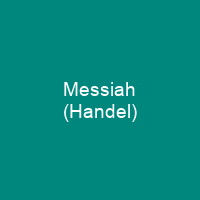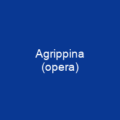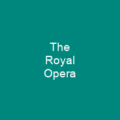Messiah is an English-language oratorio composed in 1741 by George Frideric Handel. It was first performed in Dublin on 13 April 1742 and received its London premiere nearly a year later. Handel wrote Messiah for modest vocal and instrumental forces, with optional settings for many of the individual numbers. A near-complete version was issued on 78 rpm discs in 1928; since then the work has been recorded many times.
About Messiah (Handel) in brief

The music was later recorded on 78-rpm discs and has been played many times since. It is now one of the best-known and most frequently performed choral works in Western music. The score was written by Handel for a wealthy landowner with literary interests and musical interests, Charles Jennens, a wealthy musical librettist and musical director. The composer was a vigorous champion of Italian opera, which he had introduced to London in 1711 with Rinaldo. He subsequently wrote and presented more than 40 such operas in London’s theatres. He became a naturalised British subject in 1727. By 1741 his pre-eminence in British music was evident from the honours he had accumulated, including a pension from the court of King George II, the office of Composer of Musick for the Chapel Royal, and—most unusually for a living person—a statue erected in his honour in Vauxhall Gardens. His first venture into English oratorIO had been Esther, which was written and performed for a private patron in about 1718. By the early 1730s public taste for Italian opera was beginning to fade. The popular success of John Gay and Johann Christoph Pepusch’s The Beggar’s Opera had heralded a spate of English- language ballad-operas that mocked the pretensions of Italian Opera. In other efforts to update it, its orchestration was revised and amplified by Mozart.
You want to know more about Messiah (Handel)?
This page is based on the article Messiah (Handel) published in Wikipedia (as of Dec. 05, 2020) and was automatically summarized using artificial intelligence.







